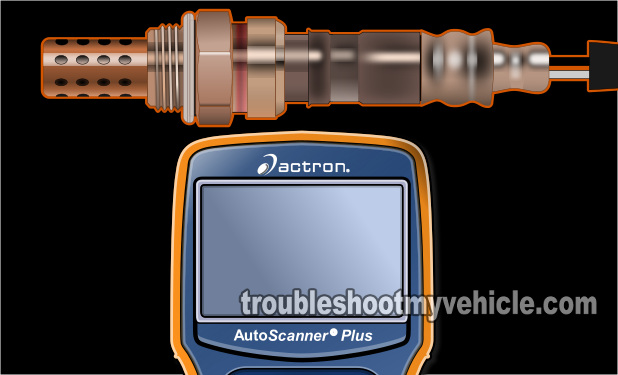
This article will help you to diagnose diagnostic trouble codes: P0135, P0141, P0155, P0161. All of these trouble codes have to do with a malfunction in the oxygen sensor's heater or it's circuit.
Contents of this tutorial:
Important Suggestions And Tips
TIP 1: Oxygen sensors get hot, since they're attached to the exhaust pipes. So, when working around them, be careful or you could get severely burned!
TIP 2: This article covers the majority of Ford vehicles (which include Mercury and Lincoln). Why? Well because the O2 sensors all have an internal heater. You can apply the info in this article with confidence.
TIP 3: This article will only help you with an O2 sensor heater code. If you need to see the full oxygen sensor test, you can find it here: Testing The Oxygen Sensors (Ford 4.6L, 5.4L).
Symptoms Of A Bad Oxygen Sensor
Having the O2 sensor's heater malfunction does not cause serious issues. Not that I'm trying to minimize the effect that a failed oxygen sensor has on the environment (it'll cause your vehicle pollute more) nor to your wallet, since the vehicle will get worse gas mileage but the fact remains that if it were not for the check engine light lighting up, you really wouldn't know that there's a problem.
There are symptoms, of course, when the O2 sensor's heater fails and the most common symptoms:
- The check engine light (CEL) will be come on and one or several of the following diagnostic trouble codes will stored in the PCM's memory:
- P0135 Heated Oxygen Sensor (HO2S11) Heater Circuit Bank 1 Sensor 1.
- P0141 Heated Oxygen Sensor (HO2S11) Heater Circuit Bank 1 Sensor 2.
- P0155 Heated Oxygen Sensor (HO2S11) Heater Circuit Bank 2 Sensor 1.
- P0161 Heated Oxygen Sensor (HO2S11) Heater Circuit Bank 2 Sensor 2.
- Really bad gas mileage.
- Won't pass state mandated emission testing.
Oxygen Sensor Trouble Code Basics
As mentioned at the beginning of the article, P0135, P0141, P0155, and P0161 DTCs share one specific and common thread: a Heater Circuit Malfunction.
What does this mean? Before I jump into an explanation of what the codes mean I'll share with you some basic working theory of how the O2 sensor works. In a nutshell, the oxygen sensor needs a specific amount of heat to activate and produce a Signal.
You would think that the exhaust would be hot enough to activate the oxygen sensors as soon as the engine is started, but this is not the case.
So, automotive engineers came up with a solution: installing a heater in the oxygen sensor. This heater makes certain that the oxygen sensor heats up and activates ASAP as soon as you start the engine and stays activated the whole time you're driving your vehicle.
The heater inside the oxygen sensor is controlled by two of the four wires that come out of it. One provides 12 Volts, and the other is the Ground circuit that the PCM provides internally. So, when the heater is functioning correctly, these 12 Volts and Ground are what get it to heat up.
And so, when you see DTCs P0135, P0141, P0155, and P0161 lighting up the check engine light, its because there's a problem with the heater inside the O2 sensor or its circuit.
Around 98% of the time, you can assume correctly (without any specific testing) that a new O2 sensor is in order and will solve the problem. In the other 2% of the cases, the oxygen sensor heater fuse has blown by a short in the oxygen sensor's wiring.
Let's turn the page and I'll tell you the two things you need to look for.
